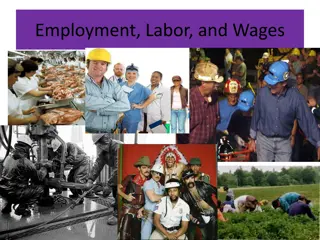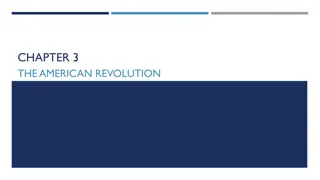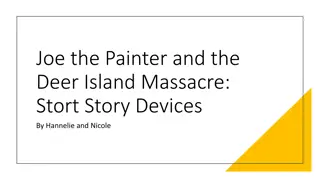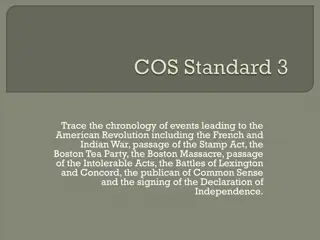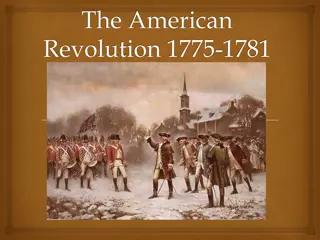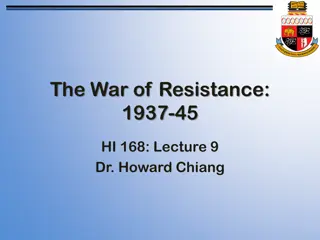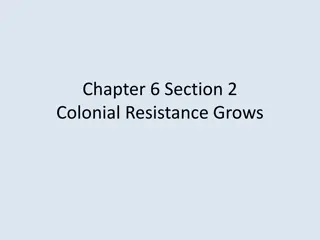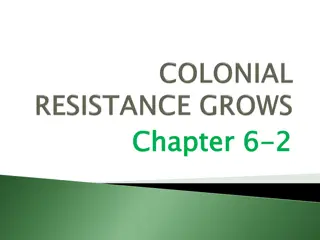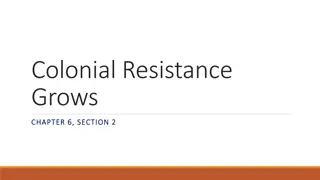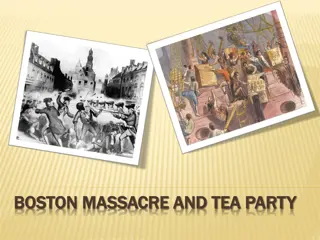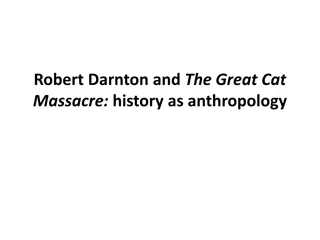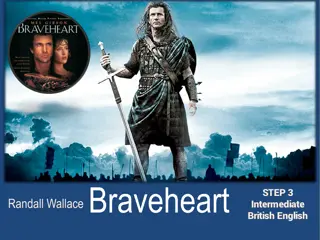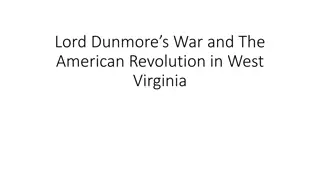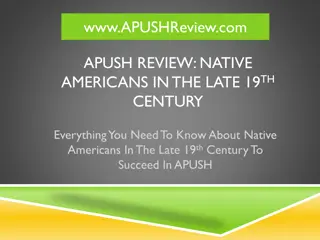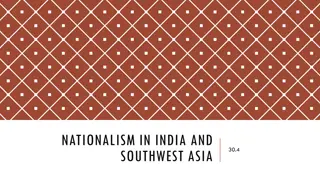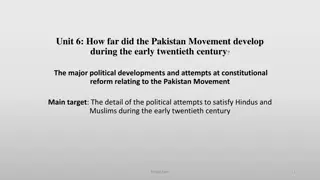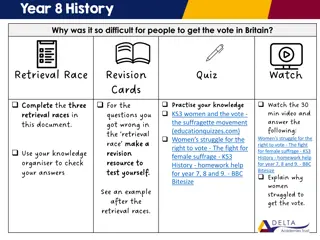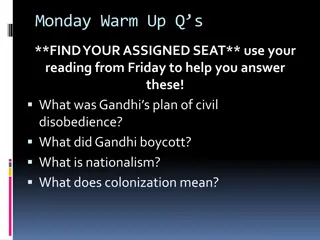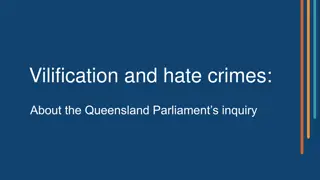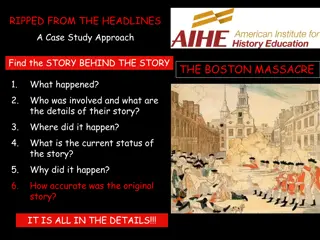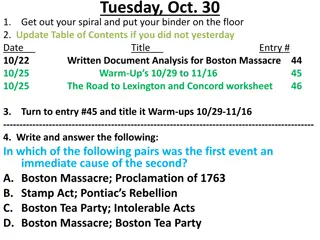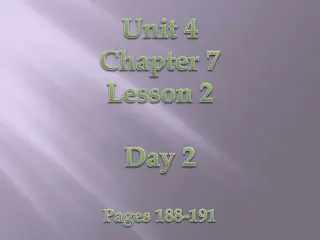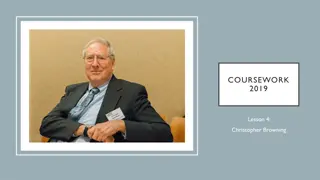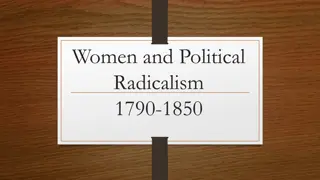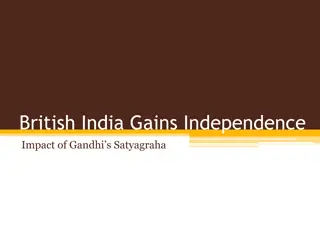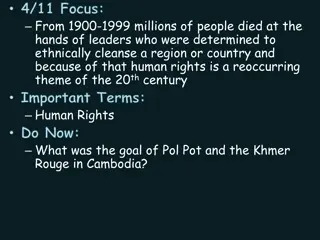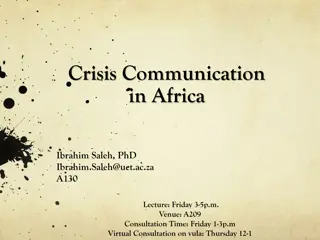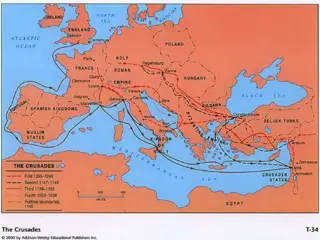Cromwell in Ireland
English authority in Ireland faced challenges after the rebellion of 1641. Cromwell was appointed to crush unrest, landing near Dublin with 12,000 men. Concerns of Parliament included the threat of Catholicism and the use of Ireland against the monarchy. Criticisms arose over Cromwell's brutal campa
0 views • 13 slides
The American Revolution: Causes, Events, and Consequences
The American Revolution was sparked by British government control over the colonies and imposition of taxes without representation. Key events such as the Boston Massacre and Boston Tea Party further fueled the revolt. The war ended in victory for America and led to the birth of a new nation. Explor
2 views • 7 slides
Evolution of Labor Movement in America: From Printers to Industrial Workers
Labor movement in America started in 1778 when printers in New York City demanded higher pay, leading to the formation of labor unions. Over the years, the workforce shifted from farmers to factory workers due to immigration and industrialization. The Civil War and westward expansion further fueled
2 views • 34 slides
Overview of American Revolution Events and Key Decisions
The content provides a detailed account of significant events and decisions leading up to and during the American Revolution, including the Boston Massacre, Boston Tea Party, First Continental Congress, shot heard 'round the world, Second Continental Congress, Battle of Bunker Hill, Common Sense, an
1 views • 21 slides
Notorious Criminals: Al Capone and Pablo Escobar
Al Capone and Pablo Escobar were infamous criminals who ran violent empires in Chicago and Colombia, involved in bootlegging, drug trafficking, and other illegal activities. Capone's reign led to the St. Valentine's Day Massacre, while Escobar's ruthless methods made him the "King of Coke." Their cr
0 views • 16 slides
Joe the Painter and the Deer Island Massacre: A Tale of Heritage and Redemption
Joe, a painter with Native American heritage, decides to join a town pageant to showcase the history with First Nations. With Chief's help, they prepare diligently, only to face disapproval during the performance. The story unfolds with a touch of irony, highlighting Joe's internal conflicts and eve
0 views • 17 slides
Key Events Leading to the American Revolution
The American Revolution was marked by significant events including the French and Indian War, passage of the Stamp Act, Boston Tea Party, Boston Massacre, Intolerable Acts, Battles of Lexington and Concord, publication of Common Sense, Declaration of Independence, and key figures such as George Wash
0 views • 22 slides
The American Revolution: Causes and Events
The Age of Revolutions in the late 18th century saw the American Revolution unfold, driven by factors like Enlightenment ideals, taxation disputes, and events like the Boston Massacre and Tea Party. The British government's actions and the formation of the First Continental Congress in 1774 further
0 views • 43 slides
The War of Resistance 1937-45: Lecture Recap on Key Events
Dr. Howard Chiang's lecture discusses pivotal events during the War of Resistance in China, such as the Marco Polo Bridge Incident, Nanjing Massacre, formation of the Second United Front, and the role of Chinese Communism. The lecture explores the brutality of the Nanjing Massacre and the collaborat
0 views • 20 slides
Colonial Resistance and Key Events in American History
Explore the growing colonial resistance during the Townshend Acts, the Writ of Assistance, the Boston Massacre, and the Boston Tea Party. Learn about key figures like Samuel Adams, John Adams, and Crispus Attucks who played significant roles in the fight against British taxation and injustice in the
0 views • 9 slides
The Colonists' Struggle for Rights and Unity: A Timeline
Colonists in the American colonies resisted British control and policies that they saw as violations of their rights, leading to organized opposition and boycotts. Events such as the Townshend Acts, the Boston Massacre, and the Tea Act of 1773 fueled tensions, prompting figures like Samuel Adams to
0 views • 10 slides
Growing Colonial Resistance and Tensions in America
Colonial resistance in America escalated with the Townshend Acts, protests, the Boston Massacre, the Tea Act, and the formation of Committees of Correspondence. Tensions between the colonists and British authorities further intensified as acts of rebellion and British responses fueled the flames of
0 views • 7 slides
Unrest in Colonial America: The Boston Massacre, Tea Party, and Growing Tensions
Discontent brewed in Colonial America as the Boston Massacre, Tea Party, and clashes with British troops fueled anger among colonists. The escalation led to boycotts, propaganda, and resentment towards Britain, culminating in the Tea Act and colonies' defiance.
0 views • 12 slides
The Great Cat Massacre: Investigating History and Anthropology
Explore the account of the Great Cat Massacre in 1730s France and Robert Darnton's investigation into it. Delve into the changing landscape of historiography in the 20th century and the emergence of culture as a pivotal research category. Understand the intricate social dynamics within the Paris pri
0 views • 11 slides
Braveheart: The Beginning of a Young Hero's Journey
In the year 1276, a young Scottish boy named William Wallace witnesses a brutal massacre that changes his life forever. With his father and brother slain, William is left with a burning desire for revenge against the English. Guided by his uncle, William begins his journey towards becoming a legenda
0 views • 53 slides
Lord Dunmore's War and The American Revolution in West Virginia
Lord Dunmore's War in West Virginia during the American Revolution involved significant events such as the Proclamation of 1763, settlements by notable figures like Zackquill Morgan and the Zane family, conflicts like the Cresap Attack and Yellow Creek Massacre, and the Battle of Point Pleasant. The
0 views • 12 slides
Native Americans in the Late 19th Century: APUSH Review
Explore the systematic relocation, conflicts, and cultural assimilation of Native Americans during the late 19th century in America. From the Indian Removal Act to the Dawes Act, witness the impact of government policies on Native tribes, culminating in tragic events like the Sioux Wars and Wounded
0 views • 8 slides
Nationalism in India and Southwest Asia: A Historical Overview
The aftermath of World War I led to a surge in nationalism in India and certain Southwest Asian countries, as empires like the Ottoman Empire and the British Empire showed signs of weakening. Indian nationalism grew due to factors such as promises of reform by the British, religious divisions, and e
0 views • 15 slides
Development of the Pakistan Movement in the Early 20th Century
The Pakistan Movement in the early 20th century saw significant political developments, including the formation of the Indian National Congress, the Partition of Bengal, and key events like the Lucknow Pact and the Amritsar Massacre. The movement reflected the growing demands of both Hindus and Musl
0 views • 21 slides
Understanding the Struggle for Voting Rights in Britain
Explore the challenges faced by people in obtaining the right to vote in Britain, focusing on the historical context of the 1800s, the impact of social conditions, and the reforms that eventually led to expanded suffrage. Learn about key events like the Peterloo Massacre, the Great Reform Acts, and
0 views • 6 slides
Struggles for Independence in India and Vietnam - A Historical Overview
The content highlights the movements for independence in India and Vietnam, focusing on key figures like Gandhi and Ho Chi Minh, events like the Rowlatt Act and Amritsar Massacre, and concepts like nationalism and civil disobedience. It also includes activities like creating timelines and analyzing
0 views • 33 slides
Understanding the Queensland Parliament's Inquiry on Vilification and Hate Crimes
The Queensland Parliament's Legal Affairs & Safety Committee is leading an inquiry to investigate hate crimes and vilification in Queensland, examining the effectiveness of current laws and encouraging submissions and stories to help address these issues. The inquiry was prompted by the rise in publ
0 views • 27 slides
Uncovering the Truth: The Boston Massacre Case Study
Explore the intricate details of the Boston Massacre through a case study approach, delving into what happened, the individuals involved, the location, current status, reasons behind the event, and the accuracy of the original story.
0 views • 13 slides
Colonial Resistance and Road to Independence
In this historical analysis, the events leading up to the American Revolution are explored, focusing on key milestones such as the Boston Massacre, Boston Tea Party, and the Intolerable Acts. The chapter delves into the causes, effects, and responses of colonial resistance against British oppression
0 views • 14 slides
Triumph and Sacrifice: The Continental Army in The Winter of Red Snow
The soldiers and Continental Army depicted in the movie "The Winter of Red Snow" were resilient, courageous, and determined as they faced the challenges of the Revolutionary War. Despite the hardships, including the Wyoming Massacre, with French aide, they eventually achieved victory at Yorktown, ma
0 views • 12 slides
Understanding the Actions of German Holocaust Perpetrators
Christopher Browning's research focuses on Police Battalion 101, revealing they were ordinary German men, not dedicated Nazis. These men were primarily middle-aged, working-class individuals who participated in the Józefów massacre during World War II. Browning's analysis delves into the motivatio
0 views • 7 slides
Women and Political Radicalism 1790-1850: A Historical Perspective
Women's involvement in political radicalism during the late 18th and early 19th centuries is explored, highlighting their roles in various movements and the challenges they faced. From the lack of voting rights to active participation in radical groups, women made significant contributions despite s
0 views • 16 slides
Impact of Gandhi's Satyagraha on British India's Independence Struggle
Gandhi's principles of Satyagraha, emphasizing civil disobedience and non-violence, played a crucial role in India's fight for independence from British colonial rule. His leadership and methods such as boycotts and peaceful protests garnered international support, pressuring the British government
0 views • 18 slides
Human Rights Abuses in the 20th Century: A Tragic Recap
Leaders in the 20th century, driven by ethnic cleansing agendas, inflicted mass atrocities resulting in millions of deaths. The theme of human rights violations prevailed, with incidents such as the Armenian Massacre, the Ukraine famine, the Holocaust, and the Rape of Nanking emblematic of the horro
0 views • 11 slides
Rabindranath Tagore: The Iconic Man of Letters and His Political Stand
Rabindranath Tagore, the Nobel Prize-winning poet, novelist, and painter, was a modernist humanist who criticized extremist nationalism. He founded Viswa Bharati University as a radical educational experiment. The context of his time, including the Jallianwala Bagh Massacre and the Swadeshi Movement
0 views • 15 slides
Crisis Communication in Africa: Strategies and Challenges
Explore the dynamics of crisis communication in Africa presented by Dr. Ibrahim Saleh. Dive into the theoretical frameworks, media impact, and applications in handling crises. Understand the importance of effective communication during challenging times and how it influences public perception and co
0 views • 18 slides
The Crusades: Pope Urban II and the Conflict with the Seljuk Turks
In the 11th to 13th centuries, the Seljuk Turks, Turkish Muslims, began to overrun Christians in the Middle East, prompting Pope Urban II to call for the re-taking of the holy land. The Council of Clermont marked the beginning of the Crusades, fueled by motives of religious fervor, wealth, land acqu
0 views • 8 slides


